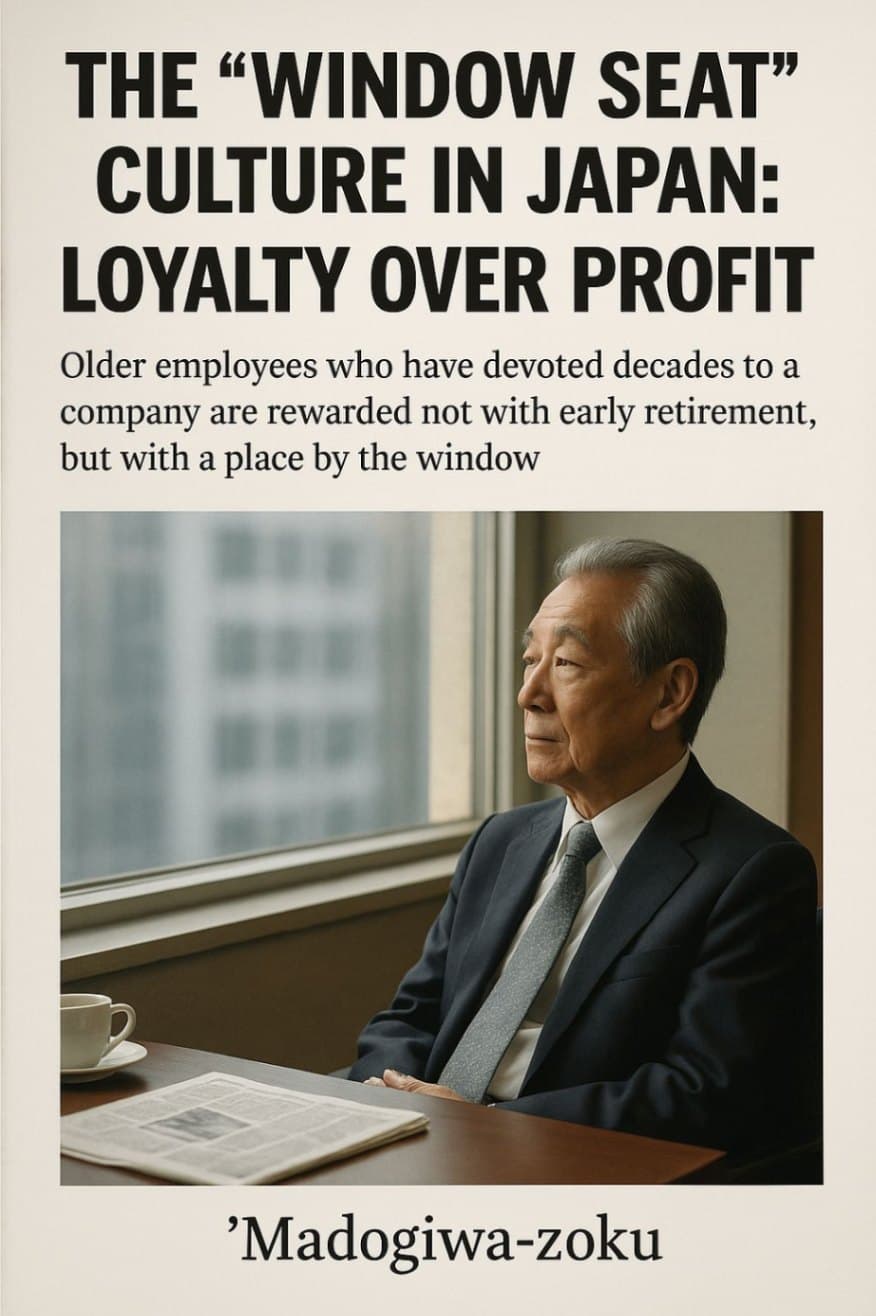Madogiwa-zoku. Why Japanese Companies PAY older Employees to do nothing.

The Window-Side Tribe: Japan’s Business Strategy That Looks Like Waste, But Builds Empires
Walk into certain Japanese offices and you might notice something strange.
A row of older employees sits by the window. They read the newspaper. Sip tea. Chat quietly. Their workload is light, their pace unhurried—yet their salaries are unchanged.
To a Western executive, this looks like madness. Why pay someone to do nothing? Fire them. Hire fresh talent. Cut costs. Move faster.
But in Japan, this quiet group has a name: Madogiwa-zoku — the Window-Side Tribe. And behind the odd tradition lies a counterintuitive strategy that has helped Japan’s corporate giants reach record profits and achieve the highest employee loyalty rates in the world.
A Seat Earned, Not Wasted
Meet Tanaka-san. He joined a manufacturing company as a young engineer in the 1980s. For 35 years he stayed—training dozens of juniors, burning through endless deadlines, sacrificing nights and weekends for the firm.
Now, he sits by the window. The company could save $60,000 a year by nudging him into early retirement. It could replace him with a cheaper hire, just like American firms do.
But it doesn’t.
Instead, Tanaka-san is paid in respect, not productivity. His window seat isn’t charity—it’s a message.
Every younger employee who sees him knows: If I give my best years to this company, I’ll be honored too.
Loyalty as Currency
The ripple effects are profound.
The 35-year-old engineer who passes up offers from competitors. The junior staffer who stays late, believing loyalty will be rewarded. The culture of trust that spreads without a single word spoken.
In numbers, the difference is stark:
- Japan’s average job tenure: 12 years
- U.S. average job tenure: 4.1 years
Fewer resignations mean fewer training costs, fewer onboarding cycles, and fewer trade secrets walking out the door. Knowledge stays. Wisdom compounds. The window seat, paradoxically, becomes one of the smartest investments a company can make.
Beyond the Spreadsheet
Western capitalism measures everything on spreadsheets: quarterly profits, efficiency metrics, cost per head.
But what can’t be measured is often what matters most.
Tanaka-san may not design new products anymore, but he does something no fresh graduate can: he mentors, warns against mistakes, and passes down invisible lessons learned over decades. He is, in his quiet presence, a living archive.
This is why companies like Toyota, Honda, and Sony embrace the practice. Their respect for the “window-side” has helped them outpace many American counterparts in innovation and resilience.
Crisis Reveals the Difference
The divergence was never clearer than during the 2008 financial crisis.
In the U.S., corporations laid off millions to preserve short-term margins. In Japan, companies held on—even to their window-side veterans.
When the dust settled, Japan’s firms recovered faster. Employees remembered who stood by them in the storm. Loyalty deepened. Legends were born.
Extending the Arc of Work
The numbers again tell a story:
- 25.2% of Japanese workers over 65 are still employed.
- In the U.S., it’s 18.6%.
- In the U.K., just 10.9%.
The “window seat” doesn’t just honor the past—it extends the arc of working life. Seniors remain engaged, their experience recycled into the system instead of discarded.
The Quiet Lesson
The modern corporate mantra is efficiency. Cut fat. Optimize. Replace. Automate.
Japan’s quiet rebellion is relationships. Trust. Respect. Continuity.
The Window-Side Tribe is more than a cultural quirk. It’s a reminder that some of the strongest business foundations are built on things you’ll never see on a balance sheet.
Loyalty, like compound interest, grows silently—and pays off when it matters most.
Sometimes, honoring the past is the smartest way to build the future.






